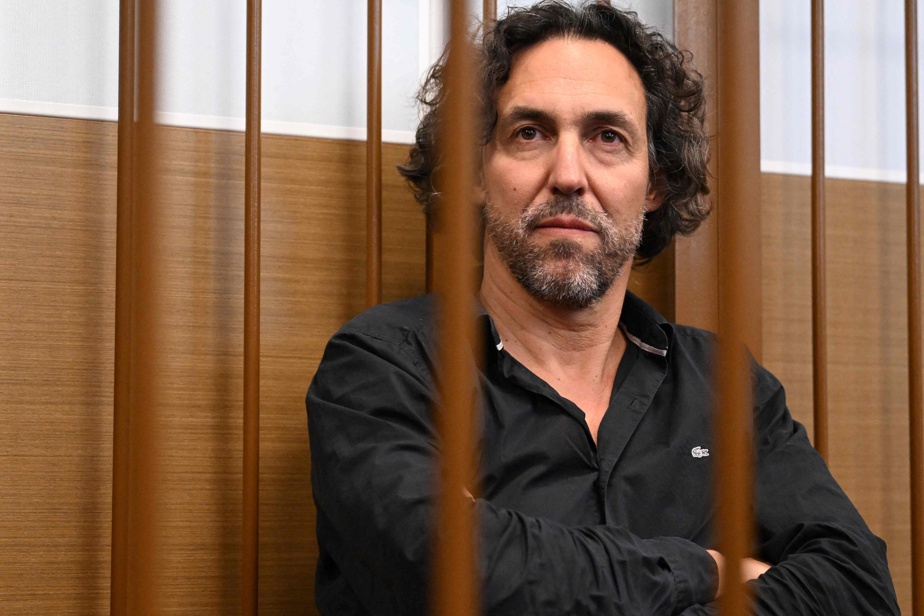(Moscow) A Moscow court on Friday placed in pre-trial detention the Frenchman Laurent Vinatier, collaborator of a Swiss conflict resolution NGO, arrested the day before and accused of collecting information on the Russian army.
The case comes at a time of heightened tensions between Russia and France, with Moscow suspected of a series of acts of destabilization and disinformation and Paris criticized for its growing support for Ukraine.
The Zamoskvoretsky court in Moscow ordered, at the request of investigators, the detention of Laurent Vinatier until at least August 5, with a view to a possible trial, AFP journalists noted on site.
He is suspected of failing to register as a “foreign agent” while collecting information on Russia’s military activities.
“Foreign agent” legislation is used by Russian authorities to suppress or monitor their critics and adversaries. The offense in question is punishable by five years in prison.
The Frenchman, with drawn features and dressed in a black shirt in the cage reserved for the accused, presented his “apologies” on Friday for not having registered as a “foreign agent” and claimed to have “held the position of Russia” in his work.
His lawyer Alexei Sinitsyn assured that his client “did not know” that he was obliged to register under this infamous label. He requested his placement under house arrest in Moscow, with his wife, and not in a detention center.
AFP did not see any representatives of the French embassy at the hearing.
The Investigative Committee, a powerful Russian body, affirmed Thursday that the information collected by Mr. Vinatier, “if obtained by foreign sources, could be used against the security of the Russian state,” which could theoretically lead to further prosecution.
According to sources interviewed by AFP, the person, aged 47, had been working on the conflict between Russia and Ukraine for many years, even before the February 2022 assault, as part of discreet diplomatic efforts. in parallel with the States.
The employer of this Frenchman, the Swiss NGO Center for Humanitarian Dialogue (HD), requested his “release” on Thursday. And French President Emmanuel Macron insisted that the person concerned was “in no way […] someone who works, who works for France”.
Mediators from NGOs like HD work confidentially and outside the constraints of traditional diplomacy, which allows informal contacts between adversaries, but this can also expose these actors to accusations of espionage.
The arrest of the Frenchman comes amidst Russian-French tensions, precisely because of Ukraine.
Paris is trying to convince its allies to send military instructors to this country to train Ukrainian soldiers, who are in difficulty facing Russian forces. Mr. Macron also spoke of sending troops, sparking anger in the Kremlin and new threats of escalation.
In addition, this arrest came the day after the arrest in the Paris region of a Russian-Ukrainian suspected of having planned violent action in France, less than two months before the start of the Olympic Games in Paris.
Russia is also suspected of multiple actions of interference, intimidation or disinformation, accusations that it rejects.
Among the actions for which such suspicions weigh: coffins installed at the foot of the Eiffel Tower in early June, graffiti in May on the Holocaust memorial, blue Stars of David stenciled in Paris and its suburbs in October 2023.
This is the case of American journalist Evan Gershkovich, accused of espionage despite his denials, those of his relatives, his country and his employer. Moscow seems to want to exchange him for a man convicted in Germany of having committed an assassination on behalf of the Russian secret services.
Switzerland and Russia also have difficult relations over Ukraine.
The Kremlin considers that the Swiss Confederation does not respect its sacrosanct neutrality, because it has adopted European sanctions and is hosting a peace summit on June 15-16, at the request of Kyiv, while excluding Russia.
Russian officials accuse Switzerland of “having lost all credibility as a neutral country and vilify the Bürgenstock conference. Should we see a link with this arrest? », asks the Swiss daily Le Temps.




